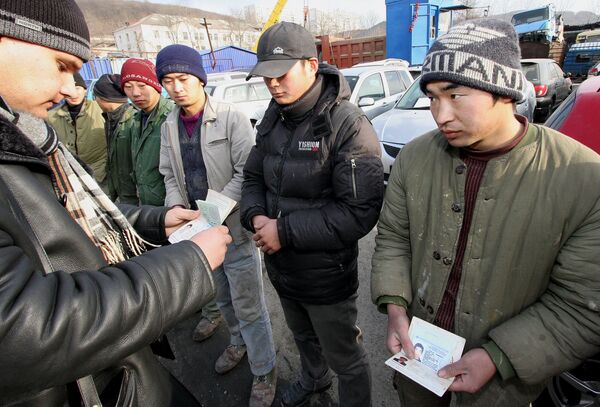NB: This story, including its headline, has been significantly modified to correct a number of imprecisions in the original.
MOSCOW, July 22 (RIA Novosti) – More than one in three Russians think the influx of people of “other ethnicities” is a very likely threat to national security, more so than terrorism or environmental disasters, according to a poll published Monday.
Such an influx was cited as a “very real” threat by 35 percent of those surveyed by the state-run VTsIOM pollster, which presented respondents with a list of 20 potential security threats to be rated in terms of likelihood.
Other threats to national security identified by the pollster and deemed “very likely” by respondents were “degradation of culture, science and education” (33 percent), environmental disasters and terrorist attacks (28 percent each) and exhaustion of oil and gas reserves (25 percent).
The baseline ethnicity presumed by the question about “other ethnicities” was “Russian,” VTsIOM spokeswoman Olga Kamenchuk told RIA Novosti, since nearly 80 percent of the country’s population self-identify as such, according to the most recent nationwide census, conducted in 2010.
The proliferation of non-Russians is now seen as less of a threat than eight years ago, however, when 58 percent of Russians cited it as the likeliest threat to the nation, the poll said. “This is not a majority of the population, this is only one in three Russians,” Kamenchuk told RIA Novosti.
Kamenchuk added that the pollsters, who went door to door to 1,600 respondents in 130 cities, clarified that the question referred to “migration from abroad.” But she noted that previous polls had shown that, in questions about ethnicity and migration, the lines can be blurred, with respondents, for example, making no distinction between people from the Russian republics of the North Caucasus and the three independent nations of the South Caucasus.
While Russia, and the Soviet Union before it, has touted its interethnic diversity, tensions along ethnic lines flare up regularly, and anti-migrant rhetoric is often heard from officials.
Russia has attracted millions of labor migrants in the past decade, many of them from impoverished former Soviet republics in Central Asia and elsewhere, but also from other countries. While some settle in Russia permanently, migration authorities have said that more than 11 million foreigners were living in Russia as of June.
Some 23 percent of those polled by VTsIOM called the “extinction” of the Russian population due to low birth rates a “very likely” security threat. (It was not clear whether the respondents meant specifically ethnic Russians or Russian nationals in general.) The government has said reversing the fall in population is a national priority, and has introduced financial incentives for women to have more children.
After the 1991 collapse of the Soviet Union, Russia’s population has shrunk by almost 7 million and now stands at 143 million, the government has said. Although last year’s fertility rate rose to 1.7 children per woman, according to the Health Ministry, it remains below the replacement rate.
The VTsIOM poll was held in mid-June and had a margin of error of 3.4 percentage points.


